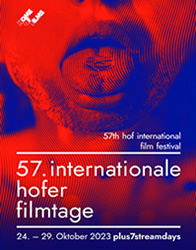A fresh breeze
To be and remain the Number 2: The fact that the 52nd Hof International Film Festival in October 2018 lived up to this claim was confirmed by many guests. The festival was as great as ever, as was the tenor, and Ana Radica also said:
“We have shown that we can do it”.
Among the new German films, which Bavarian Television praised as a stroke of luck, were such surprising discoveries as THE MOVER and GOLIATH96, HAPPINESS SUCKS and WHEN FLIES ARE DREAMING. Max Gleschinski, the director of the drama KAHLSCHLAG, was delighted with the German Cinema New Talent Award, and mentor Edgar Reitz awarded the new Hof Gold Prize to the young director Luzie Loose for her film SWIMMING.
In addition to the festival catalogue, which was presented for the first time in a handy book format, only the international program was somewhat smaller than usual, in which the British feature film about the “Frankenstein” author MARY SHELLEY and the exhibition of eleven works by Barbet Schroeder stood out. The Award of the City of Hof went to Alfred Holighaus, President of the SPIO, who was a close friend of Heinz Badewitz. One of the many enthusiastic festival visitors was also the director of the main sponsor Arte.
“Keep up the good work,”
he recommended to the organizers, and Thorsten Schaumann said he had even seen him dancing.
True to the Badewitz motto that the Hof International Film Festival doesn’t need stars, but make some themselves, the 53rd festival began with a film by the only 27-year-old newcomer Gregory Kirchhoff. It was titled BAUMBACHER SYNDROME and had a big format in every respect. Tobias Moretti, whose son Lenz also celebrated his feature film debut in the film, plays the leading role of a television presenter who wakes up one morning with the voice of a monster.
Young German cinema also impressed with complex stories such as LEBENDIG by Michael Siebert (about terminal cancer) and KOPFPLATZEN by Savaş Ceviz (about a man who suffers from his paedophile tendencies). Connie Walther’s testosterone-loaded psychological thriller DIE RÜDEN about tough guys and fierce dogs as well as Sven O. Hill’s crook comedy COUP, which was awarded the German Cinema New Talent Award, also proved to be original features. Internationally, Taika Waititi’s World War II satire JOJO RABBIT attracted a great deal of attention. In total, the third edition of the festival under the direction of Thorsten Schaumann was comprised 50 feature films.
“Among the documentaries, which reached a record number with 33 films – nine more than the year before – international women’s power stood out.”
From France came the global project WOMAN, from Australia a portrait of the American pop-rock pioneer SUZI Q, and from Germany, albeit directed by a man, DAS WUNDER VON TAIPEH, about the victory which was won by a team not recognized by the German Soccer Association at the first Women’s World Cup in 1981. Petra Landers, one of the world champions at the time, took part in the traditional HoF soccer match, which was lost 3:4 after a last-minute penalty.
The retrospective was dedicated to the Swiss filmmaker Samir, born in Iraq in 1955, whose Arabic name means “storyteller”. The Award of the City of Hof was awarded to the 35-year-old actor Max Riemelt, who made his Hof debut as the leading actor in NAPOLA in 2004.


